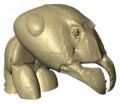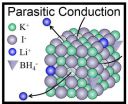(Press-News.org) Boosting a key immune process called autophagy with interferon gamma (IFN-γ) could help clear a lethal bacterial infection in cystic fibrosis, a new study suggests. The work, led by a team in The Research Institute at Nationwide Children's Hospital and published in PLoS One in May, offers new information about immune function in patients with the disease.
Cystic fibrosis, CF for short, is caused by a malfunction in the CFTR gene, which is responsible for transporting chloride and water across cell membranes. In people with the disease, cells that line the passageways of the lungs, pancreas and other organs produce unusually thick and sticky mucus that clogs the airways — creating an ideal environment for pathogens such as Burkholderia cenocepacia.
A member of the Burkholderia cepacia group of bacteria, B. cenocepacia is commonly found in soil and water and in most cases poses no health threat. However, in 2 to 5 percent of patients with CF, the bacterium causes an infection that can spread to the bloodstream, triggering widespread inflammation called sepsis that can be fatal. B. cenocepacia doesn't respond to most antibiotics, leaving physicians with few weapons to fight it. And even if their infection isn't severe, patients with B. cenocepacia are considered poor candidates for lung transplant, which many advanced CF patients require to survive.
"B. cenocepacia is multi-drug resistant, so usually when patients are ill, they are on a cocktail of antibiotics and we're hoping for a synergy of effect," said Benjamin T. Kopp, MD, senior author of the study and a principal investigator for the Center for Microbial Pathogenesis and a pulmonologist at Nationwide Children's.
Further complicating these infections, he adds, is that B. cenocepacia can replicate inside macrophages, the immune system's first line of defense against such pathogens. "It can avoid the host immune response," he said, "and that's where something like IFN-γ might work better than traditional antibiotics."
Produced by the IFNG gene in humans, IFN-γ is a cytokine active in the immune system. Earlier studies suggested that the molecule stimulates autophagy, a natural process in which proteins and other cell materials are degraded and disposed. In many diseases, including CF, autophagy is inhibited. Dr. Kopp and his colleagues wanted to see if treatment with IFN-γ might activate autophagy, allowing the body's immune system to battle B. cenocepacia.
Researchers isolated macrophages from patients with and without CF and infected them with B. cenocepacia in cell cultures. When they analyzed the samples, they found that the cells from CF patients had decreased levels of IFN-γ. They then treated the CF macrophages with synthetic IFN-γ and found that autophagy was enhanced and the bacterial infection waned.
"The goal of the study was to show if you could stimulate autophagy, you could help clear pathogens better," said Dr. Kopp, who also is an assistant professor of pediatrics at The Ohio State University College of Medicine. "These findings clearly suggest that is indeed the case."
The study is the first in a series by Dr. Kopp and colleagues to look at autophagy mediation, a growing area of interest among clinician scientists who study CF and other disorders that affect the immune system. In CF, the need for new treatments is great. Many of the infections that plague this patient population are resistant to available drugs and some of the drugs that do work have side effects that leave many physicians unwilling to prescribe them.
"As we're learning more about CF, we're finding more and more issues with the immune system and not just the typical clearance of mucus," Dr. Kopp said. "Now we're discovering that there is this initial response, of which autophagy is a part, in which the immune system is not clearing the bacteria and there are some continued deficits in that in CF patients."
According to the Centers for Disease Control and Prevention, B. cenocepacia infections have also been reported in hospitalized patients with compromised immune systems. So, Dr. Kopp added, the findings could be of interest to clinician-scientists in areas other than cystic fibrosis.
INFORMATION: END
Boosting Immune process with IFN-γ helps clear lethal bacteria in cystic fibrosis
2014-05-20
ELSE PRESS RELEASES FROM THIS DATE:
Scientists study biomechanics behind amazing ant strength
2014-05-20
A recent study into the biomechanics of the necks of ants – a common insect that can amazingly lift objects many times heavier than its own body – might unlock one of nature's little mysteries and, quite possibly, open the door to advancements in robotic engineering.
A small group of engineers at The Ohio State University combined laboratory testing and computational modeling conducted at the Ohio Supercomputer Center to determine the relationship between the mechanical function, structural design and material properties of the Allegheny mound ant (Formica exsectoides). ...
New lithium battery created in Japan
2014-05-20
WASHINGTON D.C., May 20, 2014 -- The long life of lithium ion batteries makes them the rechargeable of choice for everything from implantable medical devices to wearable consumer electronics. But lithium ion batteries rely on liquid chemistries involving lithium salts dissolved in organic solvents, creating flame risks that would be avoided if the cells were completely solid-state.
Now a team of researchers at Tohoku University in Japan has created a new type of lithium ion conductor for future batteries that could be the basis for a whole new generation of solid-state ...
Reading privacy policy lowers trust
2014-05-20
Website privacy policies are almost obligatory for many online services, but for anyone who reads these often unwieldy documents, trust in the provider is more commonly reduced than gained, according to US researchers.
Almost every commercial website, social network, search engine and banking site has a privacy policy. Indeed, these and countless other sites that scrape personal information via forms, logins and tracking cookies are obliged by law in some parts of the world to post a document online giving details of how they protect any personal data you give the site ...
Can mobile phones cause allergic reactions?
2014-05-20
New Rochelle, NY, May 20, 2014—Studies have identified mobile phones and related devices as sources of metal sensitization and potential causes of allergic contact dermatitis (ACD). Despite efforts to control allergen release in phones, many phones on the market release levels of metals, such as nickel and chromium, which are sufficient to induce ACD, according to an article in Pediatric Allergy, Immunology, and Pulmonology, a peer-reviewed journal published by Mary Ann Liebert, Inc., publishers. The article is available free on the Pediatric Allergy, Immunology, and Pulmonology ...
Climate change brings mostly bad news for Ohio
2014-05-20
COLUMBUS, Ohio— Scientists delivered a mostly negative forecast for how climate change will affect Ohioans during the next year or so, and well beyond.
Researchers report that the projected increase in precipitation and the associated runoff will likely lead to a larger-than-average bloom of harmful blue-green algae in Lake Erie this summer. In addition, the development of an El Niño over the Pacific later this year may result in a very dry 2015 in Ohio. But Ohio may fare better than its neighbors in one respect: While drought and high temperatures are expected to shrink ...
NIH researchers discover key factor in early auditory system development
2014-05-20
Researchers at the National Institutes of Health have uncovered a molecule in an animal model that acts as a key player in establishing the organization of the auditory system. The molecule, a protein known as Bmp7, is produced during embryonic development and acts to help sensory cells find their ultimate position on the tonotopic map, which is the fundamental principle of organization in the auditory system. The tonotopic map groups sensory cells by the sound frequencies that stimulate them. The study is the first to identify one of the molecular mechanisms that determines ...
Is there really cash in your company's trash?
2014-05-20
This news release is available in French. One company's trash can be another's treasure.
Take Marmite. Made from a by-product of commercial beer production, the yeast-based spread has topped toast throughout the Commonwealth for decades. By recuperating the waste product from one company, another was able to thrive.
Environmental concerns are at the forefront of government policy, so the time is right for companies worldwide to adopt this type of resource exchange, known as industrial symbiosis (IS).
A new study by Concordia University researcher Raymond Paquin ...
Engineers build world's smallest, fastest nanomotor
2014-05-20
VIDEO:
Cockrell School of Engineering assistant professor Donglei (Emma) Fan and her mechanical engineering team have built the fastest, smallest nanomotor to date. The team's nanomotor could enable controlled drug delivery...
Click here for more information.
Researchers at the Cockrell School of Engineering at The University of Texas at Austin have built the smallest, fastest and longest-running tiny synthetic motor to date. The team's nanomotor is an important step toward ...
Program to reduce behavior problems boosts math, reading, NYU Steinhardt study shows
2014-05-20
A program aimed at reducing behavior problems in order to boost academic achievement has improved performance in math and reading among low-income kindergartners and first graders, according to a study by researchers at New York University's Steinhardt School of Culture, Education, and Human Development.
Their findings, which appear in the Journal of Educational Psychology, point to the value of well-designed interventions to improve education, the study's authors say.
"Supporting young low-income children so they can reach their potential in the classroom and beyond ...
Professors' super waterproof surfaces cause water to bounce like a ball
2014-05-20
In a basement lab on BYU's campus, mechanical engineering professor Julie Crockett analyzes water as it bounces like a ball and rolls down a ramp.
This phenomenon occurs because Crockett and her colleague Dan Maynes have created a sloped channel that is super-hydrophobic, or a surface that is extremely difficult to wet. In layman's terms, it's the most extreme form of water proof.
Engineers like Crockett and Maynes have spent decades studying super-hydrophobic surfaces because of the plethora of real-life applications. And while some of this research has resulted in ...




